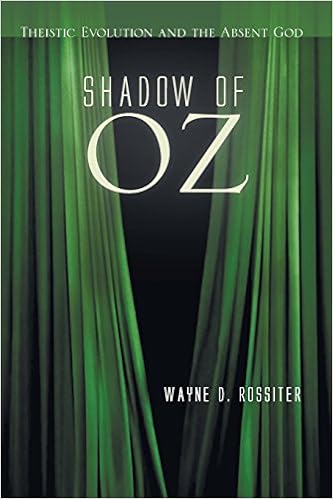But you knew that, didn’t you?
From  Waynesburg University (Pennsylvania) biology prof Wayne Rossiter, author of In the Shadow of Oz, :
Waynesburg University (Pennsylvania) biology prof Wayne Rossiter, author of In the Shadow of Oz, :
I’ve jumped to the final (summary chapter, offered by Neil Spurway), because it is one of the more dramatic examples of just how far theistic evolution can go. Here we finally see someone willing to essentially throw in the towel. For starters, he offers “for me a naturalistic account of any aspect of being human is, quite simply, the only sort of account which can be correct.” He emphasizes that many of the things we believe make humans an exception to the animal kingdom (what has been called a “revolution” rather than an “evolution”) are simply points along a sliding scale. “Every owner of a horse or dog is quite clear” of primitive conditions of consciousness, morality and love. He goes on, “For me, the imago dei simply is the sum of such properties: the sum is larger in a human being than in any other animal.”
Spurway then justifies his allegiance to naturalism: “The whole evolutionary process is God-given, not any individual step.” This of course, as I’ve been saying for a while now, is an undemonstrated assumption. Since on his view, no matter what we find, God did it, absolutely any religion could make the same claim with complete immunity. This view that everything can be explained naturalistically, such that all naturalism is God’s way of working, is given far more credence than it should be. On this view, the best evidence for God’s activity in everything is our complete inability to detect Him in anything. That is, on Spurway’s view, we can explain everything in the natural world without invoking God. So why do we include Him?
When written as plainly as Spurway puts it, we can then see why concepts like creationism or intelligent design are anathema to the theistic evolutionist. For those such as Spurway, any suggestion that God (or any agent) would be required to explain any particular phenomenon somehow suggests that the God/agent isn’t present in the others. But is that true? Take the resurrection as an example. More.
Theistic volution can explain away any evidence of design. Its only purpose has been to get Christians used to rule by naturalist atheists. And the first rule is: No design
See also: Theistic evolution empties theism of meaning
and
What the fossils told us in their own words